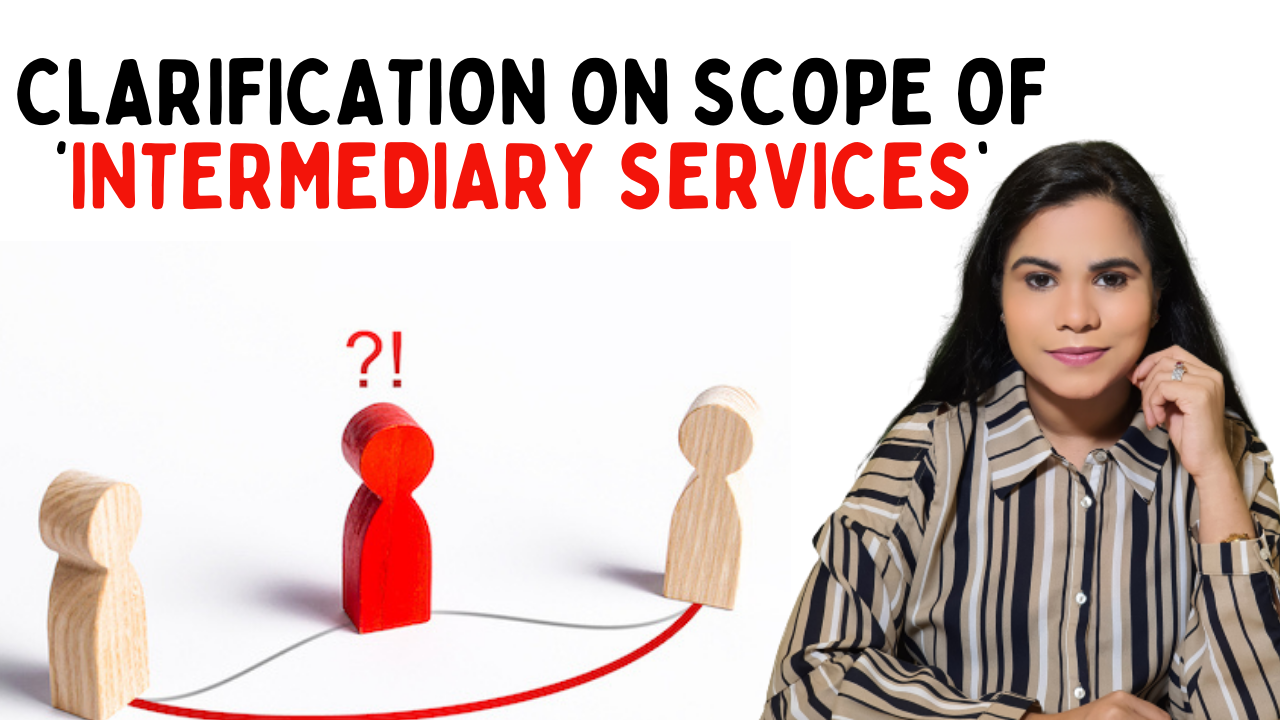All the economies in the world tries to maximize their foreign exchange earnings. For this purpose they tax only those goods and services which are provided in their taxable territory. And export of goods and services is not only kept exempt from tax, rather various export incentive schemes are launched to earn more and more foreign exchange. Export of goods means sending goods to a foreign territory. But, services being intangible, how to identify their place of performance. Therefore, specific provisions are incorporated for this purpose. In Service Tax Regime, these provisions were known as “Place of Provision of Service Rules 2012”. And in GST regime, such provisions are contained in Section 12 and Section 13 of the Integrated Goods and Service Tax Act 2017. In these provisions, except of few specific services like services relating to immovable property, the place of provision of service is prescribed as ‘location of recipient of service’.
Prescribing location of service recipient as place of performance was very much in line with the idea of keeping exports free from taxation. But, there were certain problems. Like, if a foreign company hires the services of an Indian entity for supplying its goods and services, then place of supply of such Indian Agent would be location of that foreign supplier and hence no tax would be levied. But these services are promoting import of goods and services and therefore Indian Government would like to tax such services. Let us take one more example. Suppose an Indian Exporter, hire the services of a foreign entity to identify new buyers for its goods and services. In that situation, the services of such foreign entity, though meant for promoting India’s export, but would become taxable in India.
This concept of ‘Intermediary Services’ was introduced to overcome these problems. It was prescribed that in case of intermediary services, the location of ‘intermediary’ would be the place of supply. In service tax regime the definition of ‘intermediary was contained in Rule 2 (f) of the Place of Provision Rules 2012, which reads as under.
“intermediary” means a broker, an agent or any other person, by whatever name called, who arranges or facilitates a provision of a service (hereinafter called the ‘main’ service) or a supply of goods, be tween two or more persons, but does not include a person who provides the main service or supplies the goods on his account”.
A somewhat identical definition is adopted in GST regime, which is contained in Section 2(13) of IGST Act 2017 and read as under:
“intermediary” means a broker, an agent or any other person, by whatever name called, who arranges or facilitates the supply of goods or services or both, or securities, between two or more persons, but does not include a person who supplies such goods or services or both or securities on his own account;”
During service tax regime, the scope and ambit of ‘intermediary services’ was beautifully explained by Hon’ble Advance Ruling Authority in Godaddy India Web Services Pvt. Ltd. reported as 2016 (46) S.T.R. 806 (AAR), the relevant para of which reads as under:
It is reiterated that GoDaddy US is providing to the Indian Customers services, viz.; domain name registration and transfer services; web hosting and e-mail services; designing services, sale of on-demand products services and troubleshooting services. However, applicant is providing to GoDaddy US services viz.; direct marketing and promotion services, supervision of quality of third party customer care center services and payment processing services, as per draft Service Agreement between the applicant and GoDaddy US. There is no contract between the applicant and the customers of GoDaddy US based in India. GoDaddy US have used said services provided by the applicant as per the draft Service Agreement. Further, applicant would charge a fee equal to the operating costs incurred by the applicant plus a mark-up of 13% on such costs, which would be received by the applicant from GoDaddy US in US Dollars. The benefit of services provided by applicant accrues to GoDaddy US outside India. In view of above, judgments relied upon are of no avail to the Revenue, as services provided by the applicant are to be consumed in US and not in India.
In GoDaddy (supra) it was held that Indian company was providing services on its own account and hence not covered under ‘intermediary services’. But some Advance Rulings in this current GST regime, endangered the export market of India’s service Sector. Some of Advance Rulings on ‘intermediary services’ under GST are summarized below:
- In Re: Global Reach Education Service Pvt. Ltd., 2018 (12) G.S.T.L. 387 (A.A.R. – GST), it was held that promoting courses of foreign universities and enrolling their students falls in the scope of ‘intermediary services’. This ruling is perfectly in line with the language and intent of intermediary service.
- In Re: Five Star Shipping, 2018 (18) G.S.T.L. 701 (App. A.A.R. – GST)it was held that services of monitoring of Voyage Execution for smooth and efficient operation and examination of lay time calculation etc. can be performed only when applicant interact and work in coordination with ship charters on behalf of ship owners and hence the said services are covered under ‘intermediary services’. Hon’ble Advance Ruling Authority failed to appreciate that the applicant was providing those on its own account. Now, in the present circular, the position is clarified with a similar example and it is stated that services provided on its own account are not covered under ‘intermediary services’.
- In Re: Toshniwal Brothers, 2018 (18) G.S.T.L. 129 (A.A.R. – GST), the applicant was arranging deal between overseas suppliers and Indian buyers and hence rightly held to be covered under ‘Intermediary services’.
- In Re: Vserveglobal , 2019 (26) G.S.T.L. 127 (App. A.A.R. – GST), An Indian Company was maintaining accounts of a foreign company. The said foreign company was buying goods from different countries and selling the same in other countries. The Applicant Indian Company had no role in negotiations, but as it was interacting with buyers and sellers of its principal foreign company, it was held that it was an ‘intermediary’, because it was facilitating supply between two entities. Now in the recent circular it is clarified that the phrase ‘person who facilitate supply’ has to be read in light of the preceding two terms i.e. agent or broker and if such person brokers the deal only then it will be covered under ‘intermediary’.
Comments are closed.




